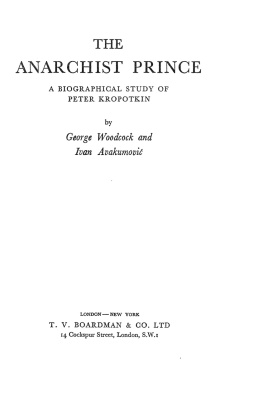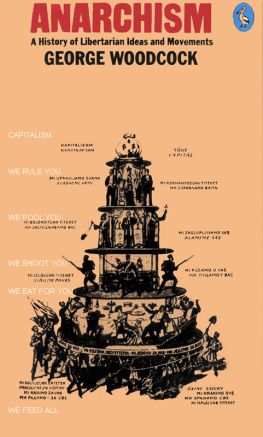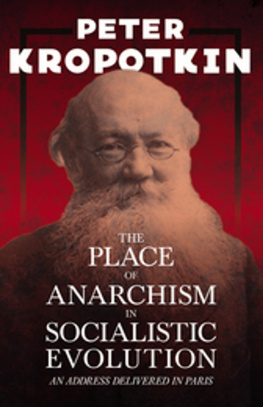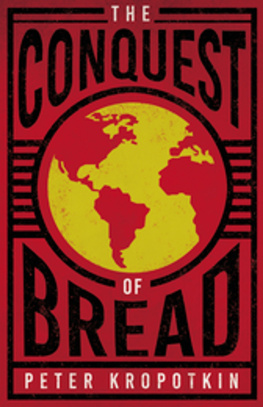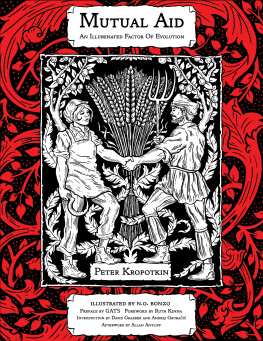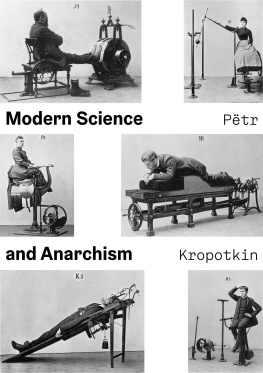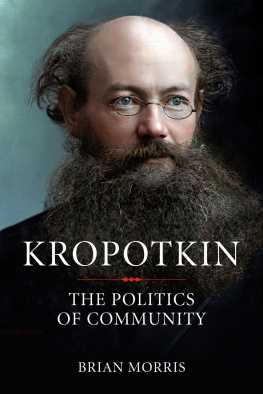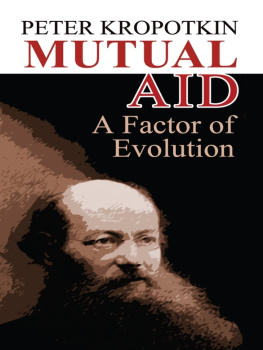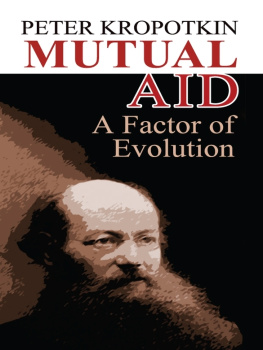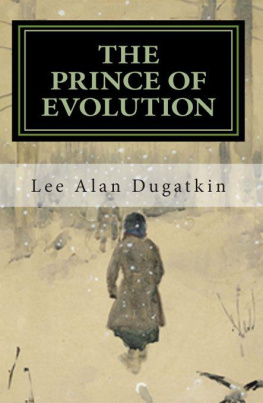George Woodcock - The Anarchist Prince: A Biographical Study of Peter Kropotkin
Here you can read online George Woodcock - The Anarchist Prince: A Biographical Study of Peter Kropotkin full text of the book (entire story) in english for free. Download pdf and epub, get meaning, cover and reviews about this ebook. year: 1971, publisher: Schocken Books, genre: Art. Description of the work, (preface) as well as reviews are available. Best literature library LitArk.com created for fans of good reading and offers a wide selection of genres:
Romance novel
Science fiction
Adventure
Detective
Science
History
Home and family
Prose
Art
Politics
Computer
Non-fiction
Religion
Business
Children
Humor
Choose a favorite category and find really read worthwhile books. Enjoy immersion in the world of imagination, feel the emotions of the characters or learn something new for yourself, make an fascinating discovery.
- Book:The Anarchist Prince: A Biographical Study of Peter Kropotkin
- Author:
- Publisher:Schocken Books
- Genre:
- Year:1971
- Rating:4 / 5
- Favourites:Add to favourites
- Your mark:
- 80
- 1
- 2
- 3
- 4
- 5
The Anarchist Prince: A Biographical Study of Peter Kropotkin: summary, description and annotation
We offer to read an annotation, description, summary or preface (depends on what the author of the book "The Anarchist Prince: A Biographical Study of Peter Kropotkin" wrote himself). If you haven't found the necessary information about the book — write in the comments, we will try to find it.
The Anarchist Prince: A Biographical Study of Peter Kropotkin — read online for free the complete book (whole text) full work
Below is the text of the book, divided by pages. System saving the place of the last page read, allows you to conveniently read the book "The Anarchist Prince: A Biographical Study of Peter Kropotkin" online for free, without having to search again every time where you left off. Put a bookmark, and you can go to the page where you finished reading at any time.
Font size:
Interval:
Bookmark:

George Woodcock
This book was produced in EPUB format by the Internet Archive.
The book pages were scanned and converted to EPUB format automatically. This process relies on optical character recognition, and is somewhat susceptible to errors. The book may not offer the correct reading sequence, and there may be weird characters, non-words, and incorrect guesses at structure. Some page numbers and headers or footers may remain from the scanned page. The process which identifies images might have found stray marks on the page which are not actually images from the book. The hidden page numbering which may be available to your ereader corresponds to the numbered pages in the print edition, but is not an exact match; page numbers will increment at the same rate as the corresponding print edition, but we may have started numbering before the print book's visible page numbers. The Internet Archive is working to improve the scanning process and resulting books, but in the meantime, we hope that this book will be useful to you.
The Internet Archive was founded in 1996 to build an Internet library and to promote universal access to all knowledge. The Archive's purposes include offering permanent access for researchers, historians, scholars, people with disabilities, and the general public to historical collections that exist in digital format. The Internet Archive includes texts, audio, moving images, and software as well as archived web pages, and provides specialized services for information access for the blind and other persons with disabilities.
Created with abbyy2epub (v.1.7.6)
First Printed 1950
TO
MARIE LOUISE BERNERI
a true disciple of Kropotkin, who died on the 13th April, 1949
PRINTED AND BOUND IN ENGLAND BY HA2ELL WATSON AND VINEY LTD AYLESBURY AND LONDON
CONTENTS
I | THE YOUTH | |
II | THE EXPLORER | |
III | THE CONVERT | |
IV | THE AGITATOR | |
V | 'the WHITE JESUS | |
VI | THE TRAVELLER | |
VII | THE WRITER | |
VIII | THE EXILE | |
IX | THE NEGLECTED SAGE | |
X | THE PROPHET | |
BIBLIOGRAPHY | ||
INDEX |
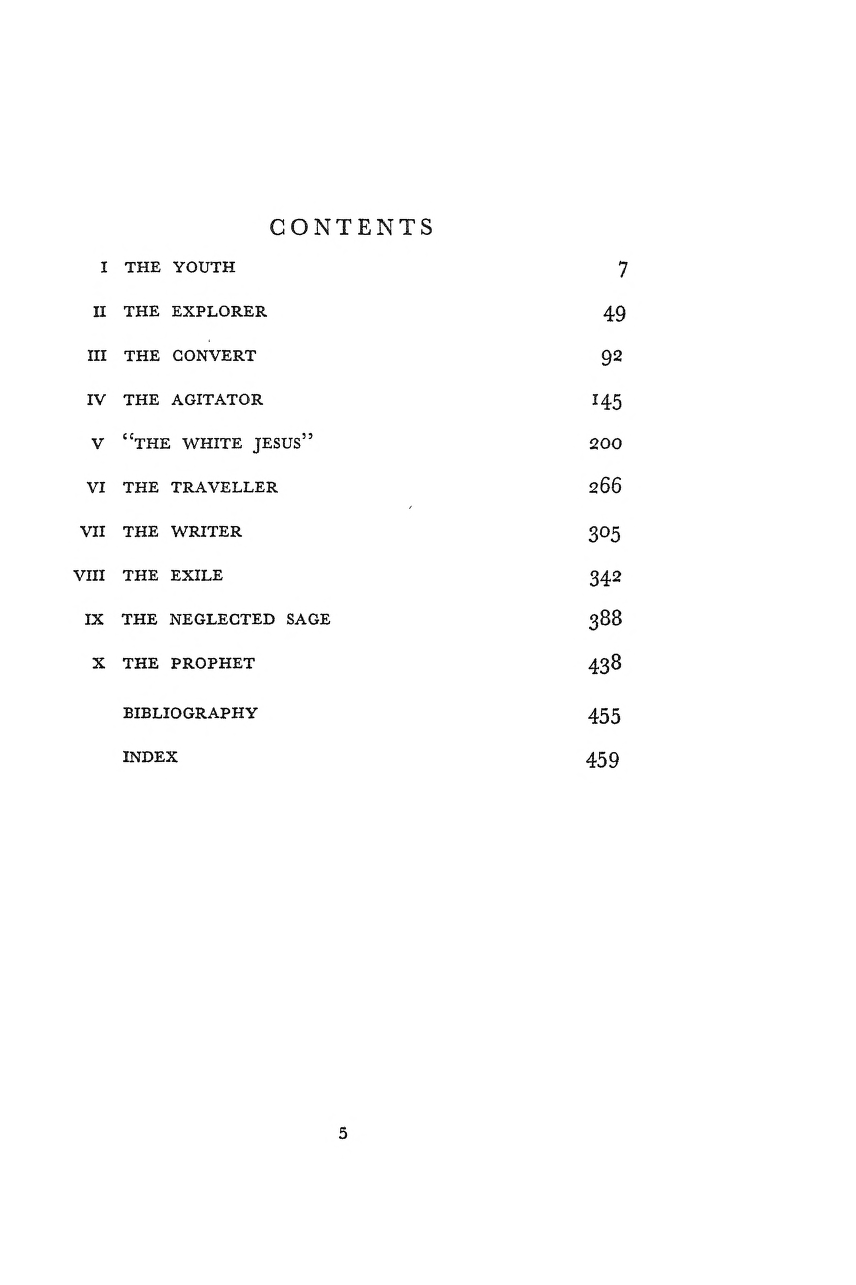
ILLUSTRATIONS
PETER KROPOTKIN FrOfltlSpid*
PETER KROPOTKIN IN i86i IN pages UNIFORM facing page
ALEXANDER KROPOTKIN 112
SOPHIE AT THE TIME OF HER FIRST MEETING WITH
PETER KROPOTKIN 102
ELISEE RECLUS 208
ERRICO MALATESTA 320
PETER KROPOTKIN ON HIS DEATHBED 336
CHAPTER I
THE YOUTH
I
The forties of the last century, characterised in Western Europe by change and unrest, were for Russia, in those days always a few steps behind the civilised world, a time of uneasy stability, of waiting for an inevitable storm. In 1842, the year when Peter Alexeivich Kropotkin was born in a mansion of the old aristocratic quarter of Moscow, the military despotism of Nicholas I had hardened into a harsh tyranny that was to continue unbroken until the old Tsar died in disappointment, after the appalling Russian reverses during the Crimean War.
The basic structure of Russian society still maintained the belated feudalism imposed on it by Ivan the Terrible and Peter the Great. It could be divided into three mutually exclusive layers, separated by gulfs of tradition and custom. There were the aristocrats, consisting of the titled nobilityPrinces, Counts, and Barons in profusionand the hereditary noblemen like the fathers of Herzen and Bakunin, who had no titles and supplied the place in Russia of the English country gentlemen. The army, the land, the civil bureaucracy were all vested in the men of this top social layer who, speaking French almost as their native language and influenced by the Prussian methods of organisation favoured by the half-German Nicholas, were as yet, before the impact of Slavophil nationalism during the following decade, hardly conscious of the fact that they were Russian. Their conversation, their interests, their ways of living, their ideas of social efficiency were borrowed from Western Europe, although at times they bore these acquired possessions with all the awkwardness of the parvenu^ of the

African chieftain parading in the cast-off frock-coat and tophat of a European traveller. Even their feudal system was alien, for it was a negation of the primitive communal economy of the mfr, which still existed beside and beneath it, and'' represented the vital element in the cohesion of rural society.
Next to this motley nobility, many of whose members were merely poor clerks or half-pay officers who earned their livelihood by bribery and by sponging on their more fortunate neighbours, lay a great middle-class stratum of merchants anjj craftsmen. Free, but deprived of many of the privileges enjoyed by the nobility, these men were as a whole much more consciously Russian. At this period, however, their influence on affairs was slight, and, though they produced some intellectuals and outstanding professional men, they were engaged principally in exploiting the trading possibilities of the industrial and agrarian revolutions that were slowly beginning to reach Russia. Related to and dependent on them was an amorphous class of poorer freemen, artisans, petty traders, porters, still involved in a small-scale industry not yet dominated by the factory system which developed during the next half-century.
At the bottom of the creaking social pyramid moved the mass of the peasants, who represented the majority of the Russian people. Except in a few isolated districts they were serfs, bound to the landowners and saleable like goods and chattels. According to feudal theory they should have been linked inalienably to the land on which they lived; there was an old saying among them that the peasants belong to the lord, but the land belongs to the peasants. Feudalism in Russia, as elsewhere, had originally implied a reciprocity of obligations. But by the nineteenth century this had almost vanished, and, except for a few enlightened men, the landowners treated the souls under their care as movable property, selling them away from the land and sending them into the army at will. Theoretically, there was redress in law for wrongful ill-treatment of serfs, but in fact little real protection existed, and the Russian State, which always favoured the powerful, on the principle that concessions of any kind would merely encourage the poor to be rebellious, usually repulsed any attempt to temper the harshness of the masters. Even after their liberation the peasants generally took it for
granted that the bureaucratic machine would always work against them, and those who have read such books on the period as Herzen^s Memoirs will realise the heart-breaking difficulties facing the isolated men who tried to obtain some genuine improvement of conditions, even on a piecemeal scale. In reality, until the emancipation of i86i, the Russian peasants were usually slaves rather than serfs in the genuine feudal sense of a man tied to his land and bound to render certain services 4^4 return for his lords protection.
Next pageFont size:
Interval:
Bookmark:
Similar books «The Anarchist Prince: A Biographical Study of Peter Kropotkin»
Look at similar books to The Anarchist Prince: A Biographical Study of Peter Kropotkin. We have selected literature similar in name and meaning in the hope of providing readers with more options to find new, interesting, not yet read works.
Discussion, reviews of the book The Anarchist Prince: A Biographical Study of Peter Kropotkin and just readers' own opinions. Leave your comments, write what you think about the work, its meaning or the main characters. Specify what exactly you liked and what you didn't like, and why you think so.

